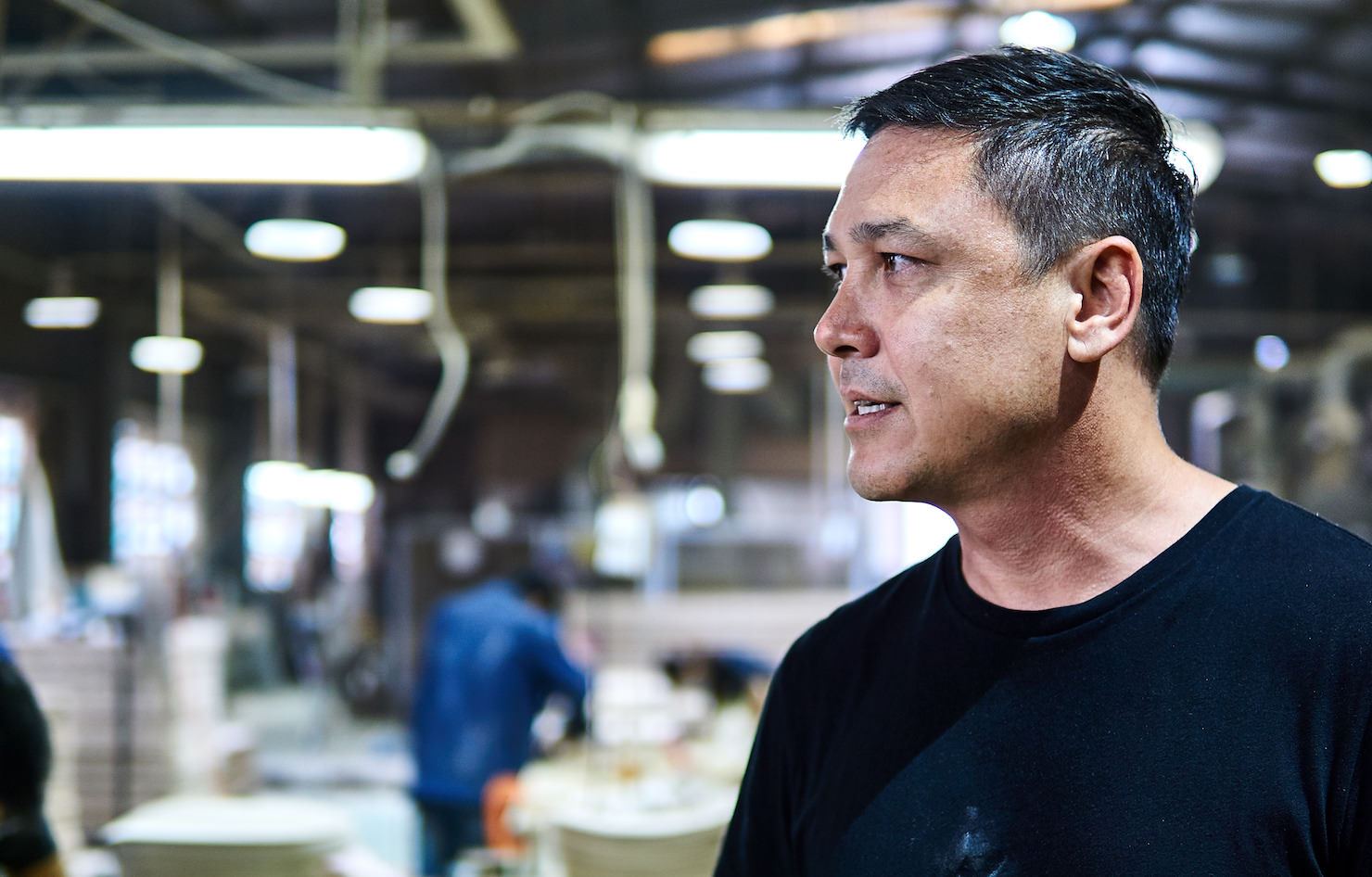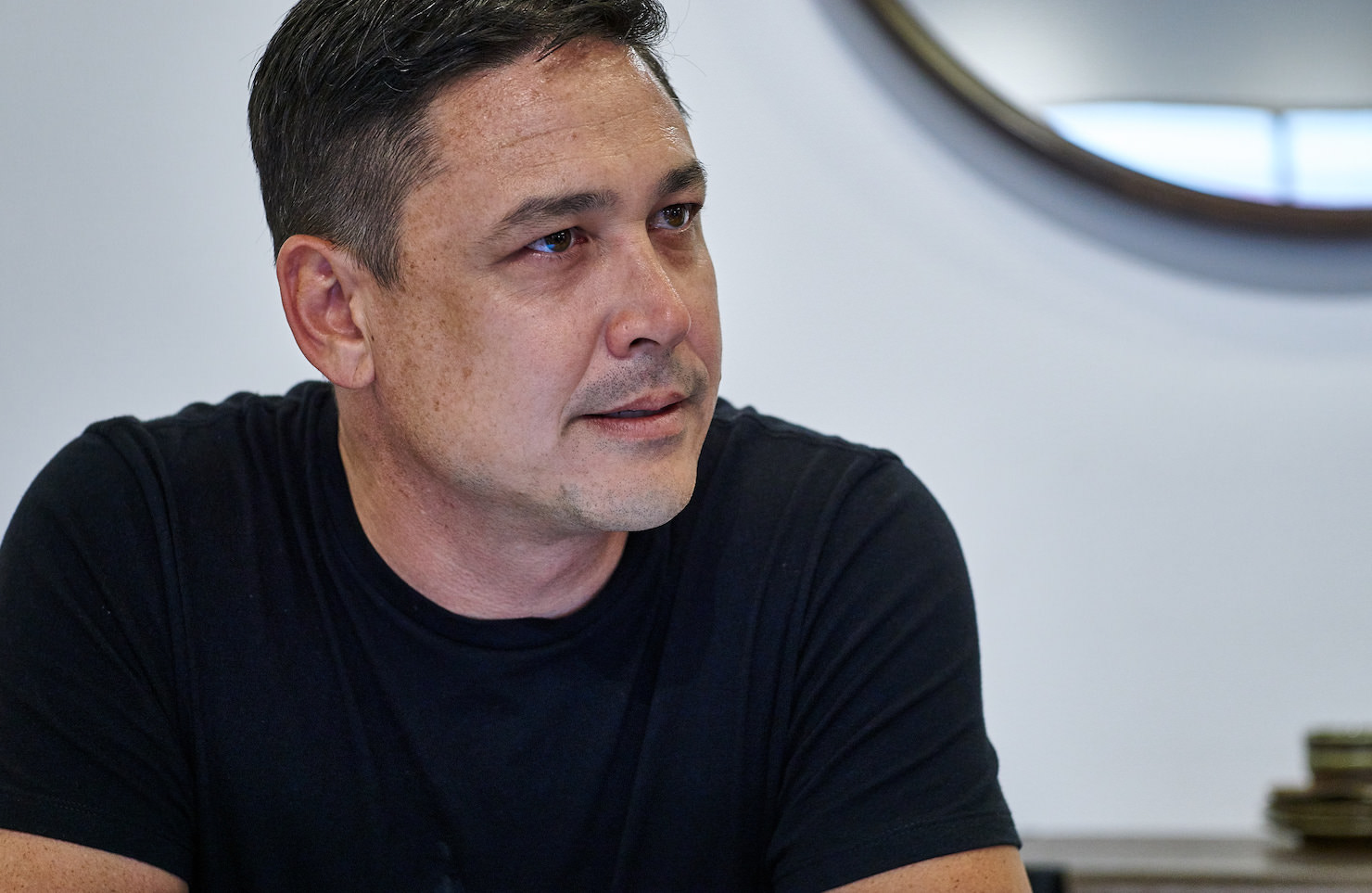Launched in 2009, L’Usine has set the standard for a new wave of entrepreneurs pursuing the evolution of modern Vietnamese brands.
As one of the first modern concepts in a city full of casual, no-name streetside cafes, L’Usine’s industrial and French colonial heritage proved to a be hit among locals and travelers alike.
Darren Chew, the lead designer of L’Usine, would go on to co-found District Eight Design, a furniture company focused on modern industrial aesthetic. Today, District Eight employs 150 employees and is both a design studio and furniture factory.
We were able to take a tour of District Eight’s new studio and factory grounds, and also sit down with Darren to talk about his experience building L’Usine, his journey to Vietnam, and what’s next for District Eight.

Why was L’Usine a hit?
It’s easy to say that the concept was the primary reason. It certainly helped, though the team was probably the most important factor. Our initial team of four had complementary skill sets that allowed us to focus on our strengths. My strength was the design, furniture, and the initial menu. I was able to focus on the planning and building phase, while my business partners focused on the operation.
What led you to focus on Industrial age and French Colonial period design?
When we built L’Usine it was all about preserving the heritage of the space. Most of the initial work reversed the changes made to the space over the last century. My main interest in industrial age and the colonial period is the quality. Things were built to last and there was a well thought out element to even the most utilitarian objects or machinery. It is a real contrast to today’s disposable, purely functional mindset.
When fitting out L’Usine we wanted the furnishings to be authentic in material and finish built with the quality of the industrial age. Too often “vintage” furniture is an excuse to make things really badly. It’s important to integrate quality into it in order to keep it timeless and sustainable.
What’s your favorite piece of furniture and why?
I always like the pieces we make for games. It’s nice to see everyone enjoy something we make. In most cases furniture made for games (like shuffleboards and ping pong tables) are cheaply made. It’s nice to bring craftsmanship and design into these products.
Who are your customers?
We sell all over the world. America and Asia is strong and we’re just starting in Europe. I would love to open up a younger market and sell more locally.
Our first trade show was in Singapore, which proved to be a great starting point for expanding our footprint into Asia.

Regarding your international customers, what led them to discover Vietnamese-designed furniture?
Vietnam is becoming an important destination for sourcing furniture. We have some great teams and factories turning out amazing furniture for export. I think Vietnam has some interesting traditional craft that is being well represented and is now starting to be recognized. It’s key that we maintain those skills and market them to the world.
Given that Vietnam’s greatest competitive advantage is the low-cost of labor, it often times leads to an erosion of value and quality. The greater the quality of course, also comes greater labor cost. It’s a game of balance. So as Vietnam develops and incomes rise, we should continue to see an improvement in quality across the board.
At District Eight, we add the value of craftsmanship which is lost elsewhere due to the cost of labor. We have the opportunity in Vietnam to make a product with methods no longer available for mass production in developed countries. Hand-craftsmanship is our advantage although we also need to look at technology to remain competitive.
We are breaking out of the perception of “everything is cheaper in Vietnam” by placing an emphasis on quality and craftsmanship. You’ll find that the quality is similar to other well-crafted furniture manufactured in Europe or North America.

Any exciting new initiatives rolling out soon?
We are always working on new product with new materials. We have some really interesting product with concrete and will release new upholstery pieces to soften up the collection. I am particularly excited about the upholstery as it will bring together my apparel background with furniture.
District Eight started off as interior design and furniture company, we eventually shed the interior design part but we’re exploring the feasibility of reintroducing it. We are also working on some sculpture projects and hope to release more lighting in the near future.
Thanks for the rundown on District Eight’s journey! A few of our readers are curious about your personal background too.
What were some of your initial struggles in Vietnam and how did you overcome it?
One of my ongoing struggles is understanding the culture and country. I think every expat that builds a company realizes that the people and labour force is why we are here. The main struggle is to motivate, train, and incentivize across cultural and gender differences.
What habits did you have to adopt in Vietnam?
Patience.
It is still something I am working on. I would like to run sometimes and grow quickly. But in all honesty, it’s best to slow down, train and build a solid foundation. I always want to do and build new things. I credit my business partners on keeping me focused.

Can you share with us one memorable story from your 20s backpacking around Vietnam? What triggered you to want to live here?
When I first moved here in 2001, Ho Chi Minh City was fun and innocent. There was no arrogance and no major class divide. I loved that you can go out to party and everyone was welcoming.
I’ve grown up with the city and I like the place where we are now but I do miss those times where the city had more character. Now Saigon is growing fast, becoming like any modern city and losing the charm. But with that loss of charm is progress for the rest of the country. It’s a positive chapter for the country overall.

What did you do before coming to Vietnam?
My original background was in cooking. I was burned out and took time off to travel. My original goal was to go back to Australia and open a cafe. Then I found that I enjoyed it here. Soon after I randomly fell into the clothing business, which was my first venture in Vietnam.
Does it get easier?
Doing business is pretty rough starting from scratch, although it definitely gets easier as the company grows and matures. With a growing business, cash flow is probably the hardest part to manage. Having a tight cashflow does teach you to work smarter and more efficiently with the workforce and machinery you can afford.
Who should I talk to next?
A21 or Vo Trong Nghia. They are doing some really interesting architecture projects here in Vietnam that are being recognized internationally.




